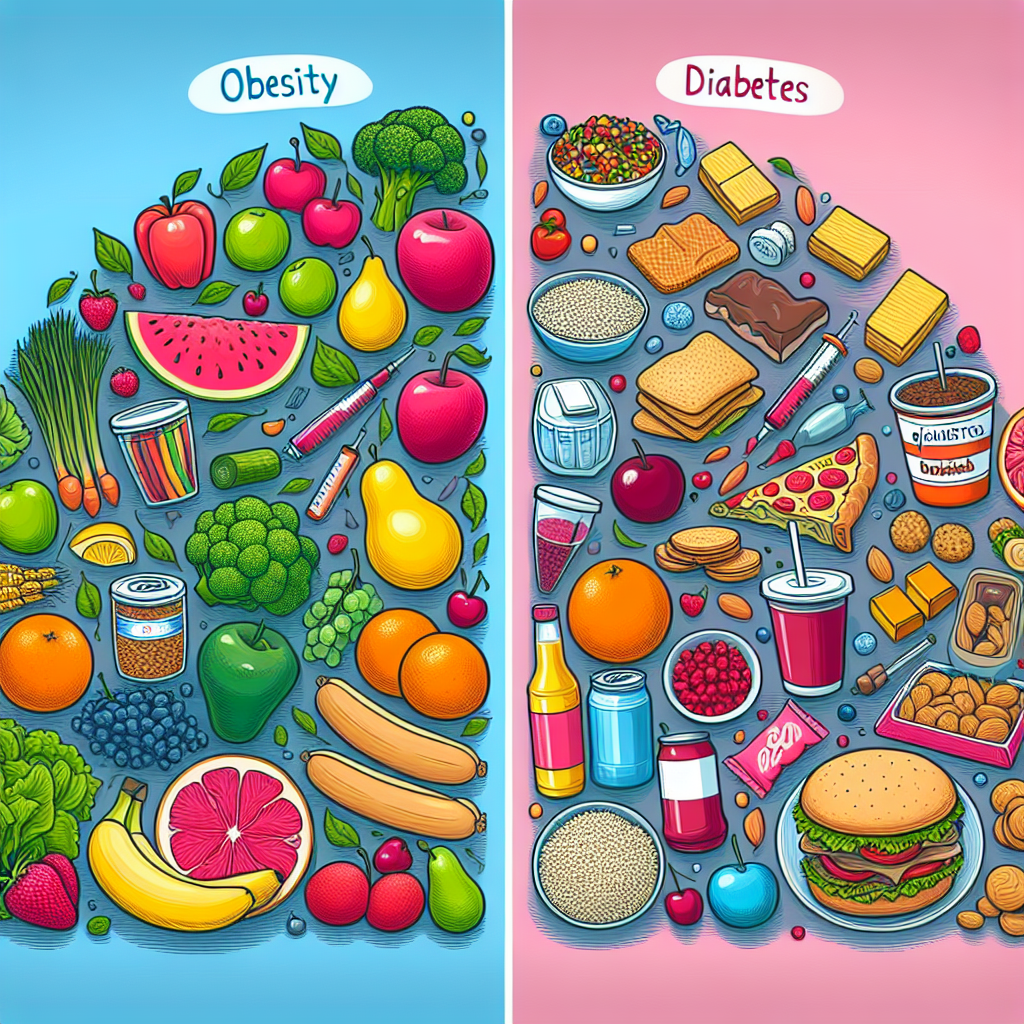Obesity And Diabetes
In the intricate dance of health and lifestyle, obesity and diabetes often harmonize in a devastating duet. Our voice in this narrative echoes the concerns of the medical community, drawing attention to the tightly knit relationship between these two conditions. The article “Obesity And Diabetes” unfurls the complexities of the issue, threading together compelling scientific evidence, illuminating personal stories and feasible solutions. Prepare to embark on a profound journey into the world of health science, tackling the alarming co-occurrence of obesity and diabetes head-on.

Understanding Obesity
Obesity is surely one of the most pressing and persistent public health issues of our times. So let’s start our article by breaking down what obesity truly means. At a fundamental level, obesity is a medical condition defined by an excess amount of body fat. It’s measured through the body mass index (BMI), a tool that calculates a person’s weight in relation to their height. An individual is considered obese if their BMI is 30 or higher.
Causes of Obesity
Just as we all differ in our appearances, hobbies, and interests, the causes of obesity are similarly varied and complex. They run the gamut from simple food consumption and lack of exercise to deeper rooted factors like genetics and societal influence. The environment where we live, learn, work, and relax also plays an instrumental role, as it influences our choices when it comes to food and physical activity.
Consequences of Obesity
There’s no sugarcoating it – obesity can have drastic consequences on our health. It puts us at greater risk for a plethora of diseases, including heart disease, stroke, and certain types of cancer. It can lead to high blood pressure and cholesterol, breathing problems, and even difficulty sleeping. It’s also associated with a higher chance of early and overall mortality.
Global Trends in Obesity
As a global society, we are seeing an alarming increase in obesity. According to the World Health Organisation, worldwide obesity has almost tripled since 1975. It is disheartening to note that more than 1.9 billion adults were overweight in 2016, out of which over 650 million were obese.
Understanding Diabetes
Next up on our discussion list is diabetes, another worldwide health concern. Essentially, diabetes is a chronic condition that affects how the body turns food into energy. It impairs the body’s ability to produce or respond to the hormone insulin, leading to abnormal metabolism of carbohydrates and increased levels of glucose in the blood.
Types of Diabetes
Not all diabetes is created equal, there are a few different types to distinguish. Type 1 diabetes is when your body cannot make insulin at all, while Type 2 diabetes – the most common type – is when your body does not use insulin properly. There’s also gestational diabetes, which occurs during pregnancy but usually goes away after the baby is born.
Risk Factors for Diabetes
There are several risk factors associated with diabetes. These include family history of diabetes, obesity, physical inactivity, poor diet, older age, high blood pressure and cholesterol, and a history of gestational diabetes.
Complications arising from Diabetes
Diabetes, unfortunately, comes with an array of potential complications. It can take a toll on the heart and blood vessels, leading to heart disease, stroke, and even necessitating amputation due to nerve damage in the feet. It can cause kidney damage, eye damage, and skin conditions. It can even affect pregnancy and hearing.
Diabetes Prevalence Globally
Similar to obesity, diabetes is also on the rise globally. The International Diabetes Federation estimates that as of 2019, there are 463 million people with diabetes worldwide, and by 2045, it is predicted to reach 700 million.
The Link between Obesity and Diabetes
We’ve discussed obesity. We’ve walked through diabetes. Now, let’s unravel their undeniable connection. Obesity increases insulin resistance and can lead to the development of type 2 diabetes.
How Obesity contributes to Diabetes
The science is clear – obesity is one of the strongest risk factors for type 2 diabetes. Excess fat, especially when located around the abdomen, makes cells more resistant to the effects of insulin, impairing their ability to control blood sugar.
Percentage of Diabetic Patients who are Obese
A high percentage of people with type 2 diabetes are obese. According to the American Diabetes Association, in the United States, about 90% of people with type 2 diabetes are overweight or obese.
Scientific Studies linking Obesity and Diabetes
Various scientific studies confirm the link between obesity and diabetes. They provide robust evidence that increased body mass index and obesity are associated with an increased risk of developing type 2 diabetes.
Genetic Factors influencing Obesity and Diabetes
It isn’t just our environment that plays a role in obesity and diabetes, our genes do too. Genetics can influence these conditions through family history, specific genetic disorders, and gene expression.
Influence of Family History
Both obesity and diabetes can run in families. If your parents or siblings have the condition, your risk is increased.
Impact of Genetic Disorders
Certain genetic disorders can lead to obesity or diabetes. For instance, Prader-Willi syndrome is associated with uncontrolled eating and ultimately, obesity. Type 2 diabetes has a more complex inheritance pattern with several genes implicated.
Role of Gene Expression in Obesity and Diabetes
Gene expression is another factor that can lead to obesity and diabetes. Epigenetic changes, where environmental factors turn genes on and off, also play a role in the development of both conditions.

Lifestyle Factors affecting Obesity and Diabetes
Regardless of our genes, lifestyle is undeniably a crucial factor in these conditions. How we eat, move, sleep and the choices we make can strongly influence obesity and diabetes.
Effect of Diet
Our diet, unsurprisingly, can significantly influence obesity and diabetes. Consuming excessive calories, especially in the form of sugary drinks and processed foods, can contribute to both obesity and diabetes.
Influence of Physical Activity
Lack of physical activity is another critical factor. Regular exercise helps to maintain weight, use up glucose as energy and make cells more sensitive to insulin.
Impact of Stress and Sleep
Don’t underestimate the power of stress and sleep. Chronic stress can trigger hormones that increase the risk of obesity and diabetes. Lack of sleep, too, has been linked to weight gain and increased risk of diabetes.
Role of Smoking and Alcohol
Last but not least, let’s not forget the role of smoking and alcohol. Both can contribute to obesity and diabetes. Smoking is linked to abdominal fat and insulin resistance, while heavy alcohol consumption can lead to weight gain and impaired insulin function.
Preventing Obesity and Diabetes
While all of this might seem overwhelming, it’s important to remember that obesity and diabetes are largely preventable. The catch? It’s all about adopting a healthy lifestyle.
Role of Diet Control
Diet control is one of the best strategies to prevent obesity and diabetes. This includes eating a balanced diet rich in fruits, vegetables, lean protein, and whole grains.
Importance of Regular Exercise
Regular exercise cannot be emphasized enough in the prevention of obesity and diabetes. It helps control weight, uses up glucose as energy, and makes your cells more sensitive to insulin.
Benefit of Weight Management
Maintaining a healthy weight can drastically reduce the risk of obesity and diabetes. Weight can be managed through diet, exercise, and if necessary, professional help.
Need for Regular Check-ups
Regular check-ups allow early detection of possible risk factors, critical in preventing obesity and diabetes. They also provide the opportunity to take immediate actions if necessary.

Managing Obesity and Diabetes
Even if obesity or diabetes does develop, there are several means to manage such conditions. Medications, surgical interventions, behavioral changes, and professional help are all viable ways towards better health.
Medications for Obesity and Diabetes
Several medications are available for obesity and diabetes. Anti-obesity medications can help reduce appetite or inhibit fat absorption, while diabetes medications help regulate blood sugar levels.
Bariatric Surgery Options
For people with severe obesity, bariatric surgery may be an option. Bariatric surgeries alter the digestive system to induce weight loss, which can also dramatically improve type 2 diabetes.
Behavioral Changes for Management
Changes in behavior, including diet control, regular exercise and sufficient sleep, are instrumental in managing obesity and diabetes.
Role of Health Professionals in Management
Health professionals play an indispensable role in the management of obesity and diabetes, through diagnosis, treatment plan formulation and continuous monitoring.
Impact of Obesity and Diabetes on Quality of Life
Obesity and diabetes can significantly impact quality of life. They affect physical health, psychological well-being, social relationships and even financial status.
Physical Health Issues
Physically, obesity and diabetes pose serious health risks. It can affect everyday activities like walking, climbing stairs or even sitting, causing discomfort and reduced mobility.
Psychosocial Consequences
The psychosocial implications of obesity and diabetes are profound. Both conditions can lead to decreased self-esteem, anxiety, depression and body dissatisfaction.
Impacts on Social Life
Social life can also be affected. People with obesity or diabetes may face stigma, discrimination and prefer to avoid social gatherings to avoid negative comments or feelings of discomfort.
Financial Implications
The financial burden of treating and managing obesity and diabetes is significant. It includes direct medical costs and indirect costs such as reduced productivity, early retirement, and disability.

Public Health Measures against Obesity and Diabetes
In order to fight obesity and diabetes, public health initiatives are crucial. These involve policies, community interventions, global actions and even sharing success stories to inspire change.
Public Health Policies
Public health policies can play a significant role in preventing and controlling obesity and diabetes. For example, regulating food marketing, implementing nutrition labelling, and providing support for physical activity can be effective strategies.
Community Level Interventions
Community interventions are equally important. These can include promoting healthier food choices, creating safe and accessible places for physical activity, and providing health education.
Global Actions against Obesity and Diabetes
At a global level, actions such as the World Health Organization’s Global Action Plan for the Prevention and Control of Non-communicable diseases aim to reduce obesity and diabetes.
Success Stories of Public Health Measures
Sharing success stories can inspire change. Whether it’s an individual who has overcome obesity, a community program that has reduced diabetes rates or a policy change that has improved public health, these stories act as motivation and a roadmap.
Future Trends in Obesity and Diabetes
Looking ahead, the battle against obesity and diabetes is far from over. Future trends, technological advancements, and research findings will play a crucial role.
Projected Trends
The Global Burden of Disease Study predicts a continued rise in obesity and diabetes. It’s crucial that we stay proactive in our efforts to change this course.
Technological Innovations for Management
In the world of tech, innovative solutions like digital apps for fitness and diet tracking, glucose monitoring devices, and telehealth services are transforming the management of obesity and diabetes.
Advancements in Research
Scientific research continues to make strides in understanding obesity and diabetes. From the genetics of obesity to the development of new diabetes medications, ongoing research provides hope for improved prevention and treatment strategies.
Implications for Public Health
With these advances, the public health approach to obesity and diabetes needs to stay fluid and adaptable. Comprehensive strategies that encompass policy, community, individual and global levels are required.
In summary, the intertwined nature of obesity and diabetes underscores the need for a comprehensive and multi-faceted approach to their prevention and management. With a deep understanding of the conditions, conscious lifestyle choices, advanced management methods and dedicated public health efforts, it’s within our collective reach to turn the tide against these global health crises.



Pingback: Which Diabetes In Due To Obesity